- Home
- Rick Riordan
Demigods and Monsters Page 10
Demigods and Monsters Read online
Page 10
When it comes to wisdom, there’s no one wiser than the goddess Athena. As her daughter, I too would be so wise. Also, I’d have cool gray eyes just like my mom. I would always have a plan, always know just what to do. I would certainly be good in a crisis, just like Annabeth. If I chose to live in the mortal world, I could be the Secretary of State, or Scrabble World Champion.
I can tell that Athena is a good mom, the way she looks out for Annabeth’s best interests. Right off the bat she says that Percy is bad news and could mean danger for her daughter, and even though that kind of thing is hard to hear, she’s just trying to be a good mom. But it could also get annoying having a mom who knows everything, sees everything. A girl should be allowed to have a secret or two.
Other Potential Dads
Ares is the god of war, and he thrives on rage and aggression. Ares is the adrenaline that pumps in your veins when you’re hopping mad and looking for a fight. If Ares were my dad, at least I’d know how to handle myself in a brawl. I’d be so tough, nobody would try and mess with me. Toughness can be a good thing. I’d like to be tough. But according to Percy in The Lightning Thief, Ares’ kids are some of the “biggest, ugliest, meanest kids on Long Island, or anywhere else on the planet.” Big, ugly, and mean? No thanks. Apparently, they aren’t too smart either. Ares is known for his brawn, not his brains. And as Annabeth says in The Lightning Thief, “Even strength has to bow to wisdom sometimes.”
I can only imagine what it would be like to have the god of war for a dad. Forget about organized sports: Ares would be the dad running along the sidelines screaming at the referee and cussing other parents out. Forget about bringing a boyfriend home: Ares would probably beat him to death with a mallet for even thinking about dating his daughter. And the fights we would get into! Ares and I would battle all the time over my curfew and my lack of killer instinct.
Then there’s Artemis’s twin brother Apollo, the sun god, god of order and reason. Apollo has proven he’s loyal to his sister, which is a plus. And I could ride around in his fiery chariot, sitting shotgun, and make the sun rise. The sun would rise and fall on my shoulders. Well, on my dad’s shoulders. Also, I’d be excellent at archery, most likely, and possibly the lyre. Apollo is also the god of poetry, which is cool. I have a feeling, though, that I might get tired of his reciting bad poetry all the time like he does in Percy’s books.
Apollo is also prophetic, meaning he knows the future. It’d be pretty sweet if that talent was passed on to me. I’d know my whole life before I even lived it. I’d know everybody’s life. I could have my own hotline where people called me for advice. I wouldn’t want to end up like Cassandra though—Apollo gave her the gift of prophecy, but when she didn’t return his love, he made it so no one would ever believe her predictions. That would pretty much suck. What’s the point of being a know-it-all if no one ever believes you?
And let’s not forget Dionysus, god of wine and fertility. He is Apollo’s brother, and also his opposite in nature. Instead of reason and moderation, Dionysus is all about pleasure and chaos. Hence the wine. Let the good times roll, that’s what Dionysus would say.
How amazing would it be to conjure up beverages whenever I wanted? A chocolate milkshake or Cherry Coke slushee right out of thin air. Not a bad trick. It would certainly make me popular at parties and weddings. But Cherry Coke doesn’t quite outweigh flying, or riding in a chariot over the sky, or even talking to horses. If I want a Cherry Coke slushee, I can just go buy one. Maybe that’s why Dionysus is so cranky; his abilities do seem to pale in comparison to the rest of his family’s. No wonder he’s got such a chip on his shoulder.
Then there’s Hephaestus, and, well, there’s not a whole lot alluring about Hephaestus. Not much at all. Not to be shallow, but he’s not exactly known as the most attractive guy on Olympus, and I’m sure his kids aren’t winning any beauty pageants either—they’re all burly from working in the metal factory. Yes, he could teach me how to be a mason or a weapons builder, but I have zero interest in being a blacksmith. What I do have an interest in, however, is magical tools. Every cool magical tool in Olympus was forged by Hephaestus. He made Hermes’ winged helmet and sandals, Cupid’s bow and arrow, and Apollo’s chariot. Maybe he’d make me a magic typewriter or something, or a golden pair of sunglasses that turns me invisible when I put them on. That’d be cool.
But it would be depressing to have a dad whose wife runs around on him all the time. His life is kind of depressing, period. There’s the whole being-thrown-from-Mount-Olympus-by-his-parents thing, which is why he’s crippled. He’s had some tough breaks, which is sure to affect him as a father—maybe he’s been hardened, but maybe not. Maybe he’s a compassionate father because of everything he’s had to endure. Then again, maybe he’s bitter because of his hard-knock life. I don’t know if I want to find out.
Since Hermes is the god of travelers and mischief, if I were his kid I could do all the traveling and mischief-making I ever wanted to do and know that my dad is watching over me, really proud. I could be the next Amelia Earhart, the next Marco Polo. But then, look at the way Luke turned out. He’s no Amelia Earhart. I know it’s unfair to do like the Oompa Loompas do and automatically blame it on the parents, but something had to have gone wrong parenting-wise, no? Still, after all Luke has done, Hermes cares for him and wants him saved. I’m not sure a lot of the other gods or goddesses would do the same for a wayward child.
Hermes encourages Percy and his friends to take risks, to carve out their own paths—to not always obey rules but to make their own. He doesn’t talk down to Percy the way some of the other gods do; he treats him like an actual person. And for a god of mischief and thievery, he’s pretty wise.
Who’s Your Daddy? Or Rather, Mommy?
Now, who to pick? There are some good options here: mermen, flying, Cherry Coke slushees. It’s a hard decision to make. Of everyone, Poseidon sounds like the best bet, a sure thing. He’s proven himself a good dad to Percy, and he has enviable powers. I’m pretty sure he’d be a good dad to me. I bet he’d give me a pearl tiara on my sweet sixteen.
But he’s not the parent I would pick. No, of all the gods and goddesses in Olympus, I would have to pick Artemis. With Artemis as my mother, the night sky and moon and stars would be mine. Who needs pearls when you can wear a strand of stars around your neck?
She would teach me bravery and independence and pride. She would teach me to respect nature and animals. She also seems like the most humble of the gods, the most willing to learn from others. Maybe it’s because she is the most childlike. Artemis is fearless and brave, yet also willing to take on other people’s burdens. She holds the world on her shoulders just as Atlas did, and of her own will. Artemis is a class act. With her as my mom, maybe I’d be one too.
But here’s the other reason I’d pick Artemis. When I die, I’d become a star just like Zoë Nightshade. I’d become my own constellation. People would wish on me before they fell asleep at night, and I would twinkle for all eternity. Travelers would be guided by my light, ships would follow my course. I’d pick all of that over being turned into a cow or a tree.
There are worse ways to go than by being turned into a shining star by your mother. In fact, I can’t think of a better way for a young hero to go. They all strive to prove their worth, to really make a name for themselves. That’s why everyone wants to be a hero in the first place—to do the right thing, but also to become immortal, to become a legend people talk about forever and ever. To be important, to their parents if no one else. Because in the end, that’s what all the kids at Camp Half-Blood really want: to be the twinkle, the star, in their parent’s eye.
Jenny Han is the author of Shug, a coming of age story about a twelve-year-old girl who learns about love the hard way. But then again, is there any other way? Jenny was born and raised in Richmond, Virginia, and now lives in Brooklyn, New York, where she writes books and also works at a school library. Her second novel, The Summer I Turned Pretty, is due out in summer
2009.
Percy, I Am Your Father
Sarah Beth Durst
Note to self: Do not become a parent in a fantasy novel.
Seriously, have you ever noticed how disturbingly often parents in fantasy novels are dead, kidnapped, missing, clueless, distant, or unknown? Kind of makes me want to round up all the authors, sit them on those pleather psychiatrist couches, and say, “Now, tell me about your mother . . .”
On the other hand, it works very nicely as a storytelling device: Get the parents out of the way and then something interesting can happen. I think of it as the Home Alone technique. You see it in books by C. S. Lewis, Lemony Snicket, J. K. Rowling . . . and you definitely see it in Rick Riordan’s Percy Jackson and the Olympians series. All the kids at Camp Half-Blood, including the protagonist Percy, are separated from their parents.
But are the parents really gone from the story? True, they don’t have much screen time, but in Rick Riordan’s books, the influence of these seldom-seen parents is so profound as to be (brace yourself—there’s a pun coming) mythic.
The parents in the Percy Jackson books run the gamut from very cool to extremely evil. To facilitate our discussion of them, I’d like to introduce: Sarah’s Sliding Scale of Parenting Skills.
Okay, so it’s not actually a sliding scale. It’s more of a report card. But that just doesn’t have the same ring to it. After all, what’s more important: accurate use of vocabulary or catchy alliteration? Don’t answer that.
Worst Parent Award (Grade = Instant Expulsion)
Let’s begin with the worst of the worst, the absolute bottom of Sarah’s Sliding Scale of Parenting Skills, the parent who is so bad that he has won the Worst Parent Award for three millennia in a row. (Several years running, he also won Worst Dressed too, when he showed up to the awards ceremony in bell bottoms and suspenders. . . . Okay, I’m just making that up. Dionysus always wins Worst Dressed for his tiger-stripe Hawaiian shirts.) The recipient of this award is directly responsible for the central conflict of the Percy Jackson series. If he had cultivated better relationships with his children, the entire series would have been different. He is the Big Bad, the primary villain. He’s also a lousy father.
I’m not talking didn’t-attend-his-daughter’s-piano-recital lousy, or even forgot-to-pick-the-kid-up-from-soccer-practice lousy. No, this paragon of parental virtue began his parenting career by eating his own children.
Yes, that’s right. He ate them. Swallowed them whole. No ketchup. No marinade. No mercy. He would have gotten away with it too, except that his wife tricked him into swallowing a stone instead of the baby Zeus. Zeus then grew up to free his siblings from his father’s stomach, slice his dear papa into pieces, and toss the pieces into the deepest pit in Tartarus.
I’m talking, of course, about Kronos, the evil Titan Lord who wants to rain death, destruction, and chaos on the world. In what is perhaps the largest understatement of the series, Percy says, “Kronos didn’t care for anyone, including his own children.”
To be fair, Kronos does have other children who he did not eat. But he’s not BFF with them either. We learn in The Titan’s Curse that Chiron, the wise and kindly centaur who trains and befriends Percy, is also Kronos’s son. He wants to accompany the heroes on their quest to save Artemis and Annabeth, but he believes that if he does, his father will kill him (thus fulfilling the Oracle’s prophecy). Regardless of whether Chiron is right or not, that’s not what I’d call a healthy relationship. To quote Percy again: “I’ve met plenty of embarrassing parents, but Kronos, the evil Titan Lord who wanted to destroy Western Civilization? Not the kind of dad you invited to school for career day.”
Failures (Grade = F)
Moving up Sarah’s Scale of Parenting Skills, we find the failures. These charmers include Ares, Smelly Gabe, and Atlas.
Atlas is easy. Killing one’s own child = an automatic failing grade. In the climactic battle in The Titan’s Curse, Atlas’s daughter Zoë Nightshade shoots arrows at Atlas to protect Percy, and then leaps between Atlas and Artemis to protect her beloved goddess. Atlas knocks her aside without a moment’s hesitation. She dies, in part from the dragon Ladon’s poison, but mostly, Percy believes, from her father’s final blow. “Atlas’s fury,” Percy thinks, “had broken her inside.” I don’t care how many archery competitions Atlas sat through or how many times he stayed up late worrying while she was out on dates with Hercules. He killed her. ’Nuf said. “She started it” is not an excuse.
Next, let’s look at Smelly Gabe, Percy’s stepdad. Unlike Atlas, he is actually responsible for saving Percy’s life. You’d think this would boost his grade, but according to the strict rules of Sarah’s Sliding Scale of Parenting Skills, intentions matter. Gabe protects him by smelling so overwhelmingly human that he masks the magical “scent” of a demigod, hiding Percy from the mythical monsters who hunt the children of gods. (I’m thinking this isn’t a literal smell, but maybe I’m wrong—Percy says “the guy reeked like moldy garlic pizza wrapped in gym shorts.” Yum.) This protection is in no way intentional on Gabe’s part. As are most people who have not encountered deodorant, Gabe is unaware of the power of his scent, magical or otherwise.
If we look at Gabe’s intentional acts, we see he emotionally abuses Percy, physically abuses Percy’s mom, and gambles and drinks away the family’s money. When his wife and stepson disappear in The Lightning Thief, he accuses Percy of foul play and milks the situation for personal gain. So while he performs a valuable service for the series (preserving the protagonist = good), as a parental figure, he fails.
Our final failure is the god Ares. Ares is the epitome of all bullies, and that translates directly into his parenting style. Look at the exchange between Ares and Clarisse in The Sea of Monsters. “You’re pathetic,” he tells her. “I should’ve let one of my sons take this quest.” She swears she’ll succeed and make him proud. He says, “You will succeed. And if you don’t . . .” He raises his fist, and Clarisse flinches. Like Gabe, he’s an abuser. Clarisse embarks on her quest in book two in large part to please and impress her dad, but she won’t get the support and praise she needs from Ares. He’s a failure as a father. (Incidentally, he’s also a failure as a son and brother. He thinks a war between relatives is the best kind of war. “Always the bloodiest,” he says. “Nothing like watching your relatives fight, I always say.” He must be such a joy at family reunions. Just imagine what Thanksgiving is like.)
Unsatisfactory (Grade = D)
Only mildly better than the actively evil parents are the negligent ones. Thalia’s mom falls into this category. All we know about her is that she was an alcoholic who died when she drove drunk. But that’s more than we know about the other D-grade parents. The other near-failures are the scores of deities who fail to acknowledge their offspring as their own. Cabin eleven at Camp Half-Blood is filled with Undetermineds (kids whose parentage is clearly divine but unknown). Percy describes them in The Lightning Thief as “teenagers who looked sullen and depressed, as if they were waiting for a call that would never come. I’d known kids like that at Yancy Academy, shuffled off to boarding school by rich parents who didn’t have the time to deal with them. But gods should behave better.”
Because of this parental negligence, the Undetermineds are left to feel bitter and angry—and are therefore vulnerable to manipulation by Luke and Kronos. Thanks to these D-grade parents, Kronos’s army grows. And that’s just inexcusable. Maybe gods aren’t into the whole introspection thing, but you’d think that after several centuries of parenthood, they’d absorb a few tips, perhaps read a few self-help books (Men Are From Mars, I Am Venus . . .). I’m with Percy—the gods should know better.
If it weren’t for the fact that all of Western Civilization would be destroyed in the process, I’d say these deadbeat moms and dads deserve the walloping that’s coming to them.
Satisfactory (Grade = C ... ish)
Four divine parents fill out the center of our bell curve. Some rate high C’s, and some rat
e low C’s. They are occasionally negligent (though this can, in part, be excused by the rule against direct interference) and occasionally manipulative (Percy calls it “treating their children as chess pieces”), but they do show some hints of parental competence.
Let’s begin with Poseidon, Percy’s father. On the plus side, he does claim Percy as his own shortly after Percy arrives at camp, which is more than many other divine parents do. (I really wish he’d said, “Percy, I am your father,” in a deep James Earl Jones voice. How awesome would that have been? That said, an elderly teacher figure does give Percy a pen that transforms into a magic sword, not unlike a light saber, and says that his father wanted him to have it when he was old enough, so my inner Star Wars geek is appeased.)
Also on the plus side: Percy’s dad is there for him every time Percy calls for help. For example, after the Chimera bites him in book one, Percy calls on his father to save him as he falls into the water, and his father not only saves him but sends someone to dispense helpful advice for completing the quest. (Looks like someone is angling for extra credit. . . .) In book two, Percy calls for help, and his dad sends hippocampi. (Hippocampi are so my newest favorite mythological creature. I keep asking my husband for one. He keeps saying no, the griffin wouldn’t like it.)
On the downside, like most of the gods, Poseidon is a rather absent father. In The Sea of Monsters, Hermes asks Percy if he ever feels abandoned by his father, and Percy thinks, “Only a few hundred times a day.” He wishes his father were with his mother, he wishes his dad would make contact more often, he wishes he’d given him more warning that he has a half-brother, and he wishes his dad would acknowledge him more. Like Clarisse, Percy craves parental approval, even if he won’t admit it. As Grover says, “You’re glad your dad is alive. You feel good that he’s claimed you, and part of you wants to make him proud. That’s why you mailed Medusa’s head to Olympus. You wanted him to notice what you’d done.”

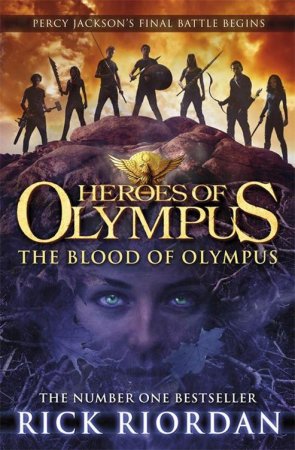 The Blood of Olympus
The Blood of Olympus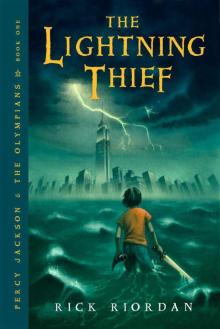 The Lightning Thief
The Lightning Thief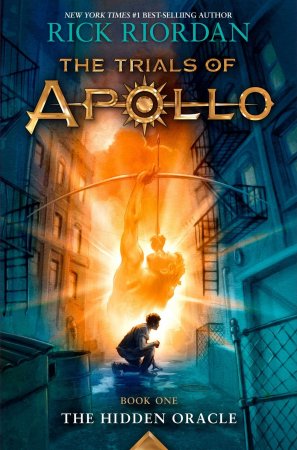 The Hidden Oracle
The Hidden Oracle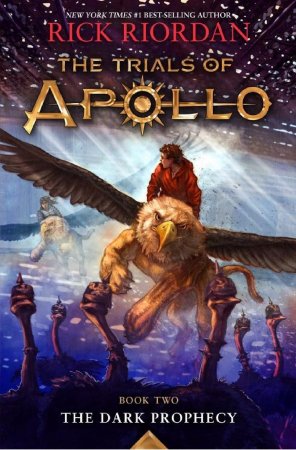 The Dark Prophecy
The Dark Prophecy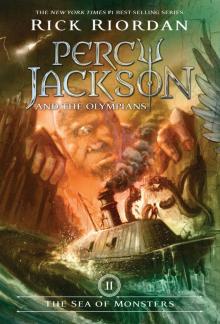 The Sea of Monsters
The Sea of Monsters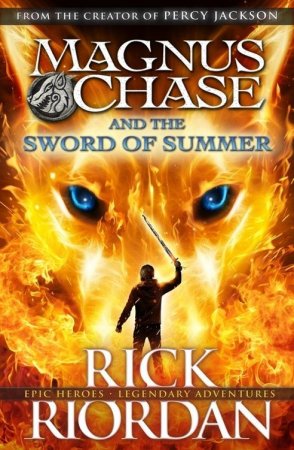 The Sword of Summer
The Sword of Summer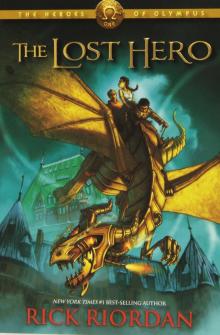 The Lost Hero
The Lost Hero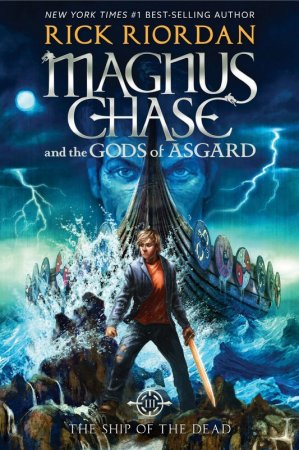 The Ship of the Dead
The Ship of the Dead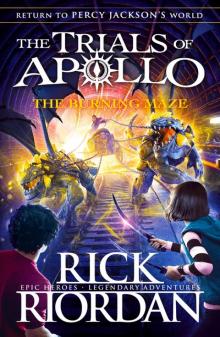 The Burning Maze
The Burning Maze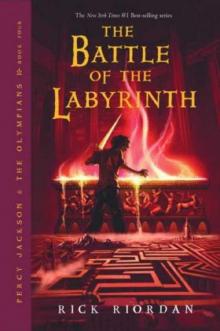 The Battle of the Labyrinth
The Battle of the Labyrinth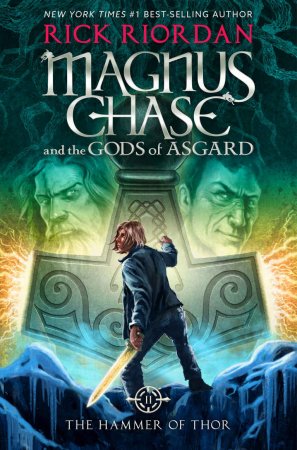 The Hammer of Thor
The Hammer of Thor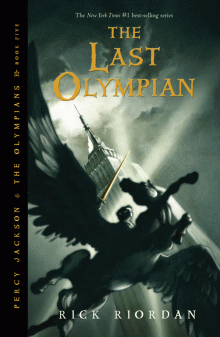 The Last Olympian
The Last Olympian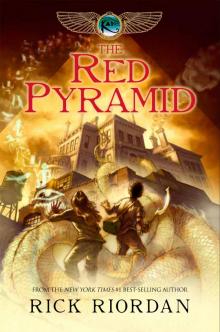 The Red Pyramid
The Red Pyramid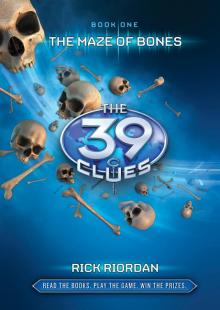 The Maze of Bones
The Maze of Bones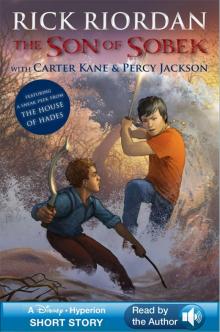 The Son of Sobek
The Son of Sobek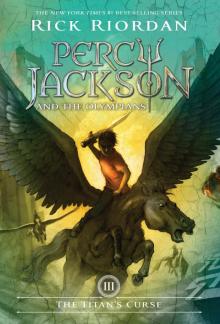 The Titans Curse
The Titans Curse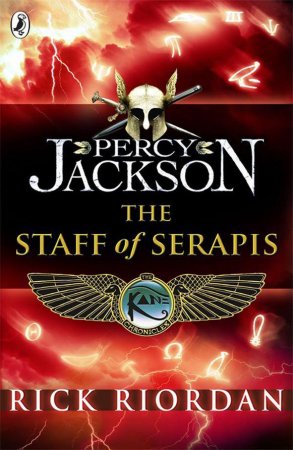 The Staff of Serapis
The Staff of Serapis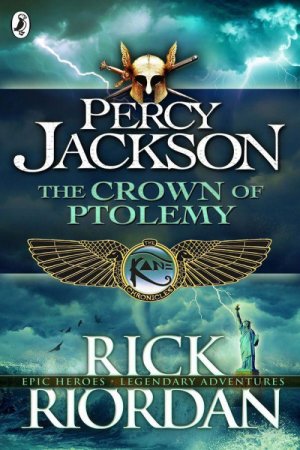 The Crown of Ptolemy
The Crown of Ptolemy Big Red Tequila
Big Red Tequila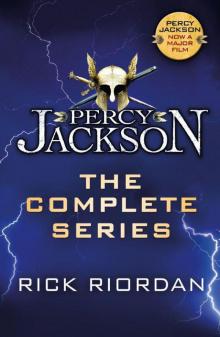 Percy Jackson: The Complete Series
Percy Jackson: The Complete Series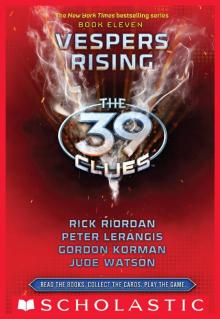 Vespers Rising
Vespers Rising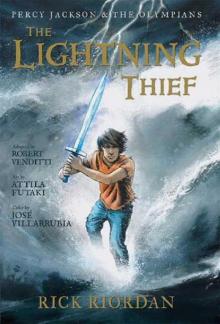 The Lightning Thief: The Graphic Novel
The Lightning Thief: The Graphic Novel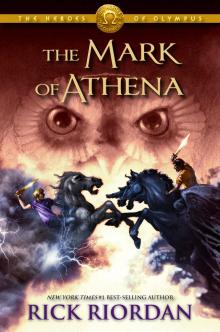 The Mark of Athena
The Mark of Athena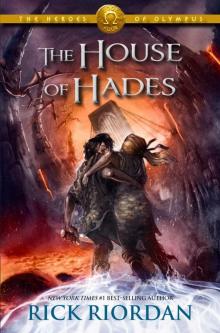 The House of Hades
The House of Hades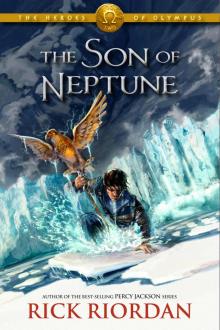 The Son of Neptune
The Son of Neptune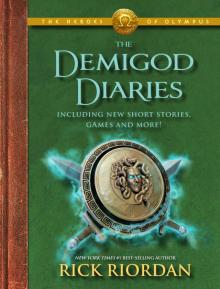 The Demigod Diaries
The Demigod Diaries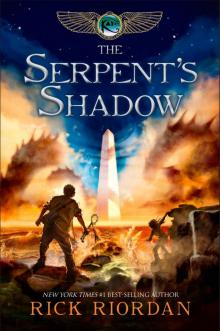 The Serpents Shadow
The Serpents Shadow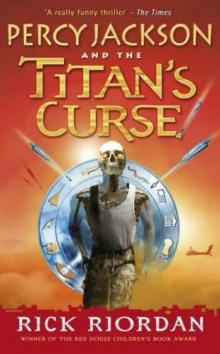 The Titan's Curse pjato-3
The Titan's Curse pjato-3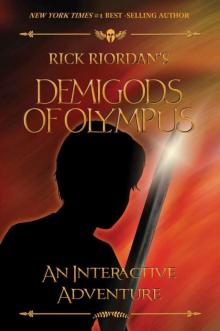 The Demigods of Olympus: An Interactive Adventure
The Demigods of Olympus: An Interactive Adventure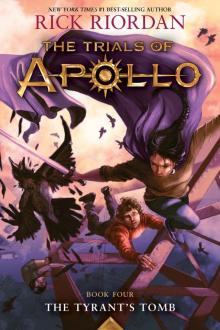 The Tyrant's Tomb
The Tyrant's Tomb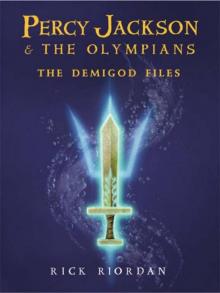 The Demigod Files
The Demigod Files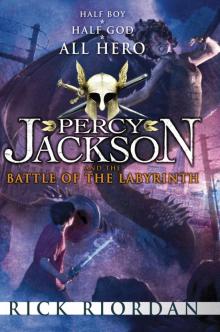 Percy Jackson and the Battle of the Labyrinth
Percy Jackson and the Battle of the Labyrinth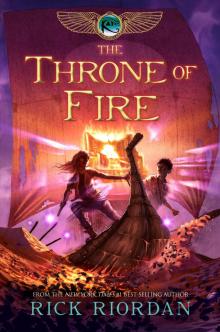 The Throne of Fire
The Throne of Fire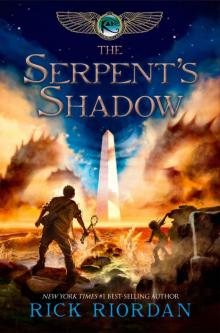 The Serpent's Shadow (The Kane Chronicles, Book Three)
The Serpent's Shadow (The Kane Chronicles, Book Three) Mission Road
Mission Road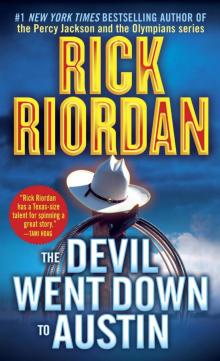 The Devil Went Down to Austin
The Devil Went Down to Austin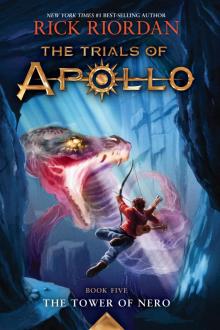 The Tower of Nero
The Tower of Nero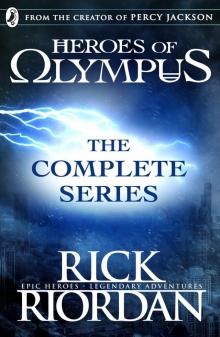 The Heroes of Olympus: The Complete Series
The Heroes of Olympus: The Complete Series Rebel Island
Rebel Island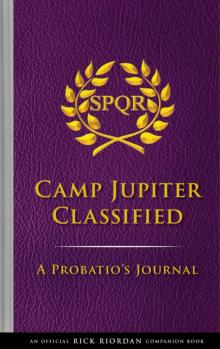 The Trials of Apollo Camp Jupiter Classified: A Probatio's Journal
The Trials of Apollo Camp Jupiter Classified: A Probatio's Journal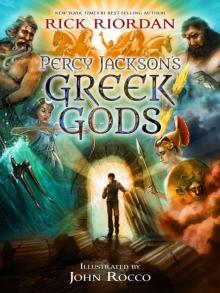 Percy Jackson's Greek Gods
Percy Jackson's Greek Gods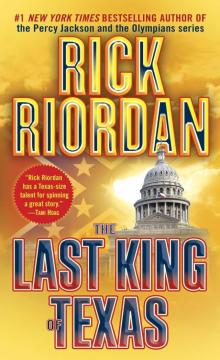 The Last King of Texas
The Last King of Texas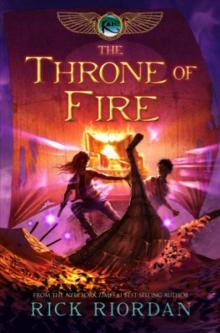 The Throne of Fire kc-2
The Throne of Fire kc-2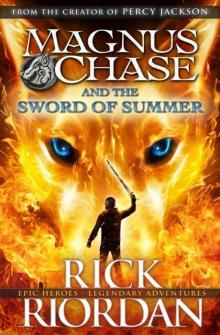 Magnus Chase and the Sword of Summer
Magnus Chase and the Sword of Summer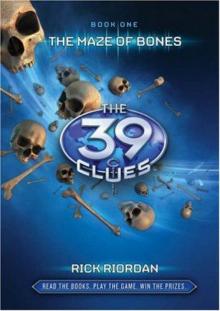 Maze of Bones - 39 Clues 01
Maze of Bones - 39 Clues 01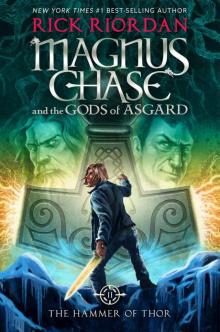 Magnus Chase and the Gods of Asgard, Book 2: The Hammer of Thor
Magnus Chase and the Gods of Asgard, Book 2: The Hammer of Thor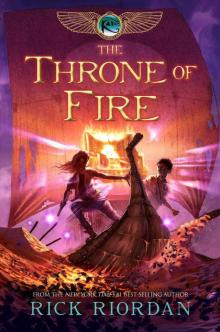 Kane 2 - The Throne of Fire
Kane 2 - The Throne of Fire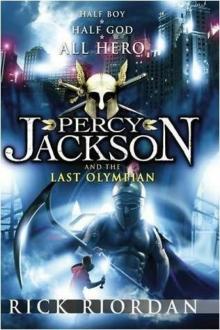 The Last Olympian pjato-5
The Last Olympian pjato-5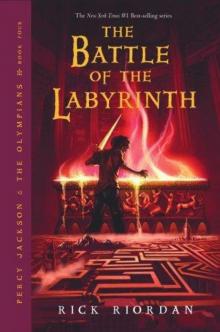 The Battle of the Labyrinth pjato-4
The Battle of the Labyrinth pjato-4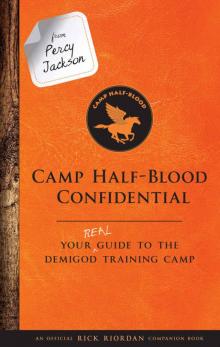 From Percy Jackson: Camp Half-Blood Confidential: Your Real Guide to the Demigod Training Camp (Trials of Apollo)
From Percy Jackson: Camp Half-Blood Confidential: Your Real Guide to the Demigod Training Camp (Trials of Apollo)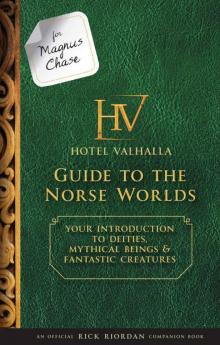 For Magnus Chase: Hotel Valhalla Guide to the Norse Worlds: Your Introduction to Deities, Mythical Beings, & Fantastic Creatures
For Magnus Chase: Hotel Valhalla Guide to the Norse Worlds: Your Introduction to Deities, Mythical Beings, & Fantastic Creatures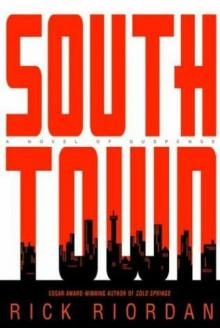 Southtown tn-5
Southtown tn-5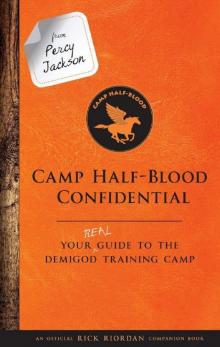 From Percy Jackson_Camp Half-Blood Confidential
From Percy Jackson_Camp Half-Blood Confidential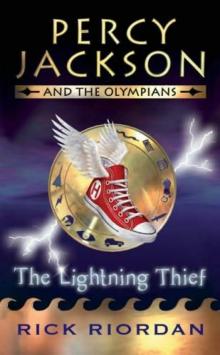 The Lightning Thief pjatob-1
The Lightning Thief pjatob-1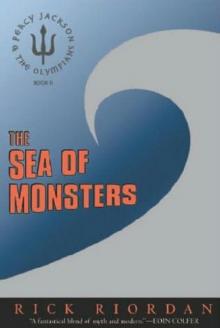 The Sea of Monsters pjatob-2
The Sea of Monsters pjatob-2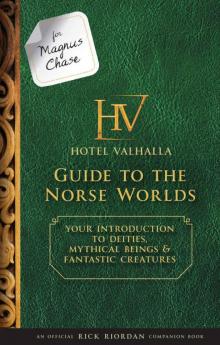 For Magnus Chase_Hotel Valhalla Guide to the Norse Worlds
For Magnus Chase_Hotel Valhalla Guide to the Norse Worlds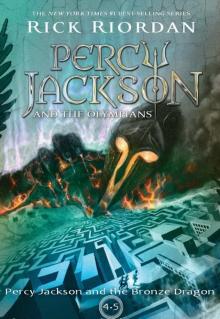 Percy Jackson and the Bronze Dragon
Percy Jackson and the Bronze Dragon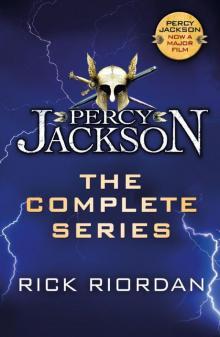 Percy Jackson: The Complete Series (Books 1, 2, 3, 4, 5)
Percy Jackson: The Complete Series (Books 1, 2, 3, 4, 5)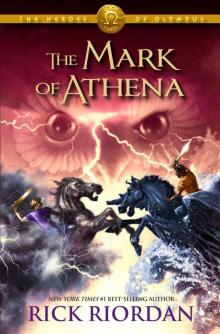 The Mark of Athena (The Heroes of Olympus, Book Three)
The Mark of Athena (The Heroes of Olympus, Book Three)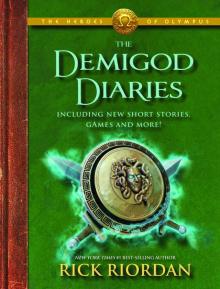 The Heroes of Olympus: The Demigod Diaries
The Heroes of Olympus: The Demigod Diaries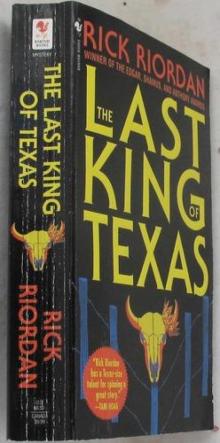 The Last King of Texas - Rick Riordan
The Last King of Texas - Rick Riordan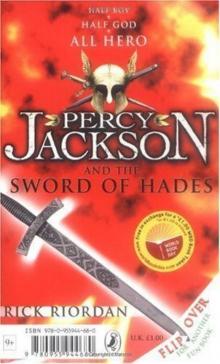 Percy Jackson and the Sword of Hades
Percy Jackson and the Sword of Hades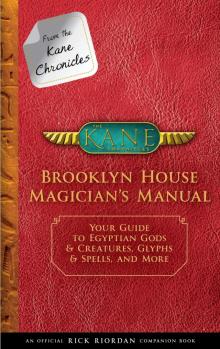 Brooklyn House Magician's Manual
Brooklyn House Magician's Manual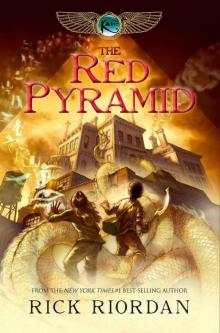 The Kane Chronicles, Book One: The Red Pyramid
The Kane Chronicles, Book One: The Red Pyramid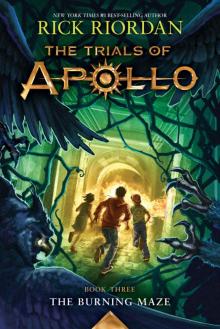 The Trials of Apollo, Book Three: The Burning Maze
The Trials of Apollo, Book Three: The Burning Maze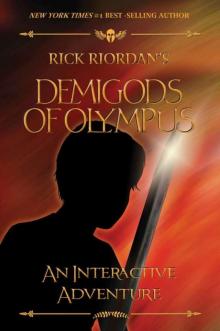 The Demigods of Olympus
The Demigods of Olympus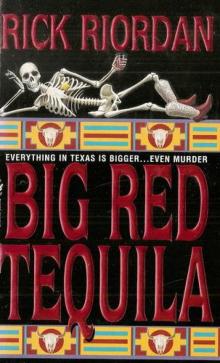 Big Red Tiquila - Rick Riordan
Big Red Tiquila - Rick Riordan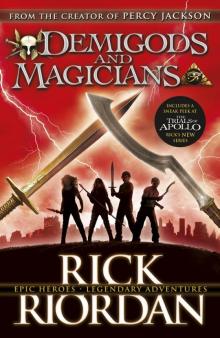 Demigods and Magicians
Demigods and Magicians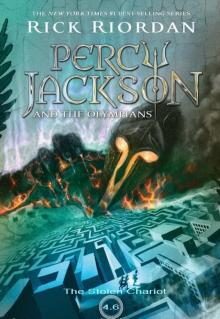 Percy Jackson and The Stolen Chariot
Percy Jackson and The Stolen Chariot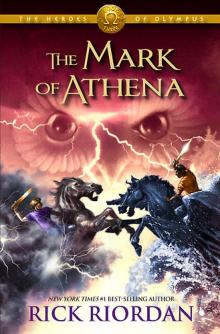 The Mark of Athena hoo-3
The Mark of Athena hoo-3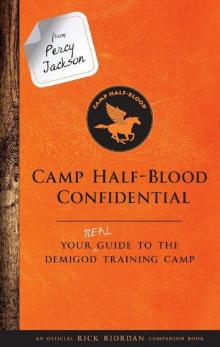 From Percy Jackson: Camp Half-Blood Confidential: Your Real Guide to the Demigod Training Camp
From Percy Jackson: Camp Half-Blood Confidential: Your Real Guide to the Demigod Training Camp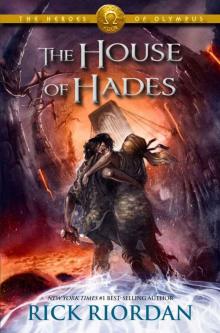 The House of Hades hoo-4
The House of Hades hoo-4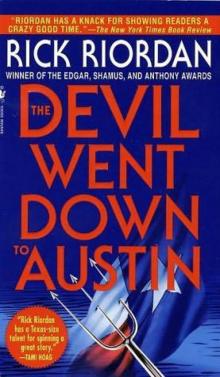 The Devil went down to Austin tn-4
The Devil went down to Austin tn-4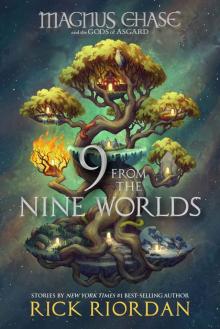 9 from the Nine Worlds (Magnus Chase and the Gods of Asgard)
9 from the Nine Worlds (Magnus Chase and the Gods of Asgard)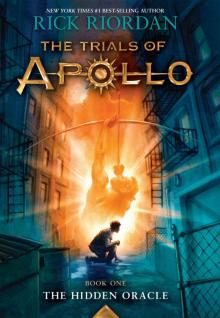 The Trials of Apollo, Book One: The Hidden Oracle
The Trials of Apollo, Book One: The Hidden Oracle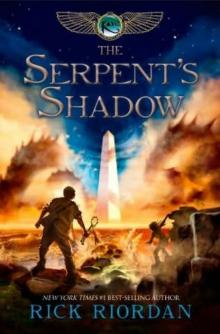 The Serpent's Shadow kc-3
The Serpent's Shadow kc-3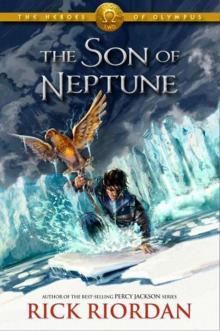 The Son of Neptune hoo-2
The Son of Neptune hoo-2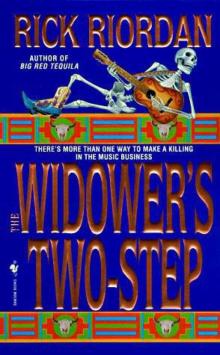 The widower’s two step tn-2
The widower’s two step tn-2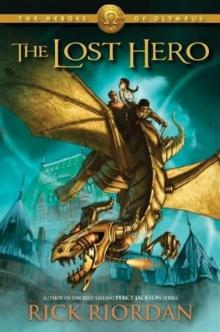 The Lost Hero hoo-1
The Lost Hero hoo-1